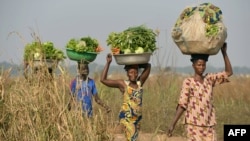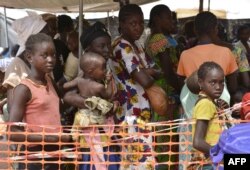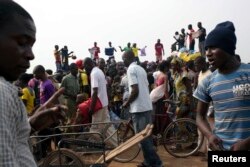It is yet another busy market day in PK5, the last remaining Muslim enclave in the Central African Republic's capital, Bangui.
Farmer and businesswoman Philomene Pata has been coming to the market to sell her goods for as long as she can remember. But recently, such visits reportedly have become increasingly dangerous for her and other women who live in the M'poko displaced persons camp at the Bangui airport.
In bringing her produce to the market, Pata says the anti-balaka — the mostly Christian militia — would take her phone, her money and her goods. Sometimes, she says, she would be beaten and told, "This will teach you to not bring food to the Muslims."
While the security situation in Bangui has improved somewhat in recent months, some neighborhoods are still under militia control. One area of the M'poko camp is controlled by an militia leader known as Emar Nganafeï.
Some aid agencies have suspended their work in the camp because of the volatile situation. Last month, at least 10 men — some of them armed — stormed and looted the camp’s hospital, run by Doctors Without Borders.
Women on their way to the market are constantly harassed by the anti-balaka militia, says Blandine Nah, the president of a women's association in the camp.
Nah says the men kidnap the women as they leave the camp and rape them. It happens all the time, she adds, but especially during the night.
Sometimes the men then let the women go, Nah says, but other times they only release women after their families pay a ransom.
Nah has met dozens of rape victims in the camp. Many of the women lost their husbands when the Muslim Seleka rebels attacked Bangui in December 2013. Many have a hard time supporting their families.
The women have no work and are struggling, Nah says. Some of them are sleeping with men outside the camp for money, but when they return, Nah says, the militia inside the camp kidnap them and rape them.
Rights group backs claims
During two weeks in December, Human Rights Watch documented at least 25 acts of sexual violence in Bangui. The number is likely much higher, as many of the cases are never reported because of the social stigma.
The organization also documented at least five cases where women and girls were raped by Muslim self-defense groups, some who were conducting revenge attacks against Christian and animist neighborhoods near the enclave.
Nah says there is no security at the camp and peacekeepers only stop by occasionally.
The International Criminal Court has been conducting investigations in the C.A.R. A special criminal court that is set to start working this year could help address crimes, including sexual violence, and provide justice for the victims.
Meanwhile, the estimated 20,000 people at the M'poko camp remain largely unprotected, as U.N. peacekeepers and French forces known as Sangaris have made it clear they will not provide security.













